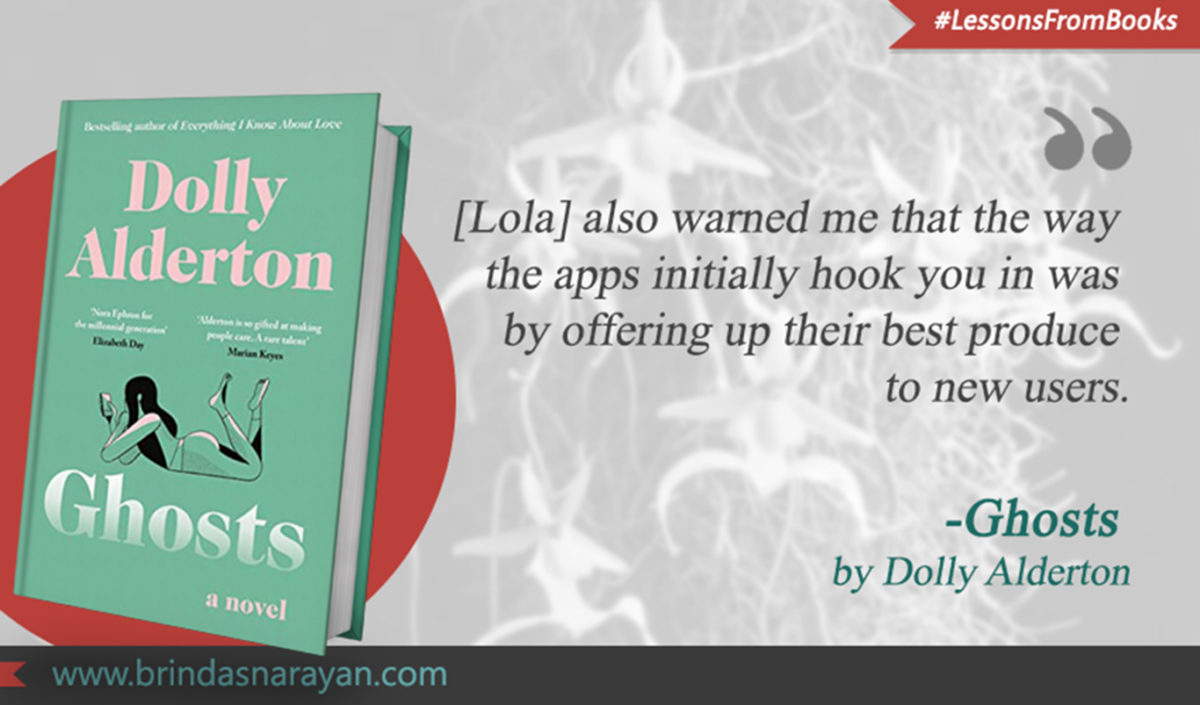
A Glimpse into the Travails of Modern Romance
If you’re curious about the culture of “romance” among millennials in London, Dolly Alderton’s Ghosts might offer some unnerving insights. Her protagonist, Nina George Dean, is a thirty-two year old on the hunt for a fairytale ending to her singledom. Nina is also an accomplished food writer and successful cookbook author, so she’s not exactly a damsel-in-distress waiting for a magical rescue. But she does want to meet a partner, and maybe start a family, with a Mister Compatible.
She embarks then on the natural next step in the digital era – she downloads an App called “Linx”, which her best friend Lola assures her has “the highest yield of eligible men and the best success rate.” Besides its enticing yield rates, the app also seems to make the hunt less physically strenuous. After all, one no longer needs to gad about town, into propitious places where one might bump into likely partners. As a somewhat enthused Nina puts it, in the early stages of scrolling through all the potentials, “ I could do it while watching TV.” Like an edgy but eager tourist navigating a foreign terrain, Nina quickly categorizes the men into types: “Festival Man” – a type that blew up his allowances in attending festivals, Readerly Sorts – “who wanted you to know they’d read…a lot of books” and so on.
Soon enough, Nina swipes right on Max, who feels rather tellingly for us readers, too good to be true: “He was earthly and godly; elemental and ethereal.” This is Nina’s rather impetuous assessment, within a few minutes of meeting him on a first date. One can almost sense her rushing headlong into what feels like a potentially calamitous relationship. Even as Max is overly charming, and chivalrous – isn’t that an outdated quality? Clearly not so, in the British capital – everything seems to be progressing at a frighteningly furious pace. More so, when Max hints at wanting to marry her at that first meeting.
The relationship continues to gallop as Max and she discover a dreamlike chemistry on all fronts. Their conversations crackle, their kisses spark, they wholeheartedly accept each other, warts and all. They are both as nervous perhaps, about their accelerated yearning for togetherness, so they almost deliberately try to slow things down. Try to move at a “new, easier pace.” As readers, we’re twiddling our thumbs by now, waiting for a surprise, or an anguished twist. Like: is Max simultaneously dating many other women? Or in this era of fungible identities, is Max not Max at all?
Alderton is clearly tapping into a real trend, rather than trying to make this a nail-biting read. Just when things are heating up between Nina and Max, almost heading to an altar-like climax, Max vanishes. Disappears into thin air. The verb used to describe this action is “ghosting”. To ghost someone is to vanish from his or her life. This apparently, if one goes by comments posted on Goodreads, is a kind of power game still being played out among heteronormative couples. Wherein Prince Charmings are ubiquitous, whereas Prince Reliables are as rare as the ghost orchid, a plant that is known for its “spindly, phantasmal appearance” (https://rarest.org/nature/plants). As one reviewer on Goodreads put it: “Perhaps because I could relate to Nina so much, reading about her experience was PAINFUL.”
Since I have been out of touch with the terminology associated with modern relationships, I resorted to googling the term “ghosting”. An online article introduces the lexicon surrounding technology-enabled relationships. Ghosting tops the list, but there are other fascinating verbs, many drawn from the world of phantoms. For instance, “haunting” describes the subtle reappearance of a partner who had once ghosted you. Like someone who might “like” one of your social media posts, but does not really re-enter your life in any other tangible way. Then there is “submarining”, when a partner suddenly leaps back into your physical world, and behaves like nothing had changed since he or she ghosted you.
And this is what Max does to Nina. He reappears or submarines. Of course, he apologizes profusely, attributing his disappearance to childhood trauma. To being abandoned by his own parent as a child. And even as we readers would like to caution Nina, we watch her plunge back into the relationship, giving her heart again to this capricious man, who is certain perhaps of only one thing: his self-indulgent uncertainty. And he ghosts her again. And then Nina’s friend, Lola, is also ghosted by a man whom she is ready to buy a house with.
While such behaviours might hardly be “new”, they gain a different kind of resonance in lives mediated by devices. Both Nina and Lola seem to attribute the shiftiness of most “males” to their tech-dominated childhoods. To the fact that they played too many video games, and have hence lost the ability to abide with the monotony of commitment. Whether one agrees or not with the facile conclusions of its protagonists, Ghosts offers, like other pop-culture artefacts, revelations into who we have become.
Perhaps, as the MIT sociologist Sherry Turkle phrased it in the title of her book, “Alone Together: Why We Expect More From Technology and Less From Each Other,” we are living in a kind of lonesome fellowship. Since technology is already reshaping other aspects of human life, surely intimate relationships, whether in the form of budding romances or family interactions, cannot resist the proliferation of seductive choices. Why would the “rational” Max or Jethro (Lola’s ghost) settle down, when something better is a mere click or swipe away?
References
Alderton, Dolly, Ghosts, Penguin Random House UK, 2021
Turkle, Sherry, Alone Together: Why We Expect More From Technology and Less From Each Other, Basic Books, New York, 2011
https://www.goodreads.com/book/show/50042494-ghosts#other_reviews




